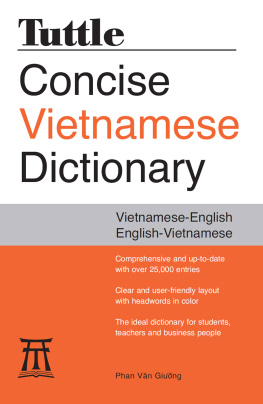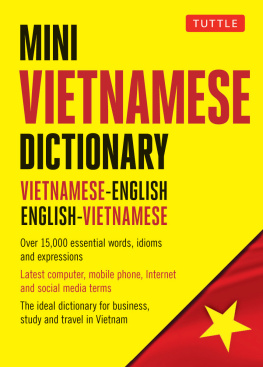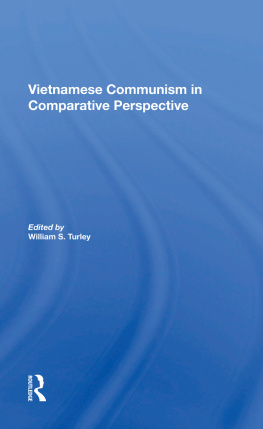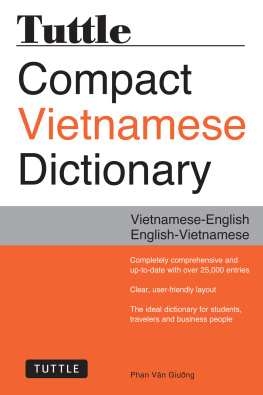
Literature and Nation-Building in Vietnam
This book analyzes why Indians have been made invisible in Vietnamese society and historiography. It argues that their invisibilization originates in the formulaic metaphor Vietnamese nation-makers have used to portray Indians in their quest for national sovereignty and socialism.
The book presents a complex view on colonial legacies in Vietnam, which suggests that Vietnamese nation-makers associate Indians with colonialism and capitalism, ultimately viewed as non-socialist and non-hegemonic state structures. Furthermore, the book demonstrates how Vietnamese nation-makers achieve the overriding socialist and independent goal of historically differing Indians from Vietnamese nationalisms whilst simultaneously making them invisible. In addition to primary Vietnamese texts, which demonstrate the performativity of language and the Vietnamese traditional belief in writing as a sharp weapon for national and class struggles, the author utilizes interviews with Indians and Vietnamese authorities in charge of managing the Indian population.
Bringing to the surface the ways through which Vietnamese intellectuals have invisibilized the Indians for the sake of the visibility of national hegemony and prosperity, this book will be of interest to scholars of Southeast Asian Studies and South Asian Studies, Vietnam Studies, including nation-building, literature, and language.
Chi P. Pham is a researcher at the Vietnam Academy of Social Sciences, Vietnam, and an Alexander von Humboldt postdoctoral researcher at the Institute of Asian and African Studies, University of Hamburg, Germany.
Routledge Contemporary Southeast Asia Series
The aim of this series is to publish original, high-quality work by both new and established scholars on all aspects of Southeast Asia.
Embodied Performativity in Southeast Asia
Multidisciplinary Corporealities
Edited by Stephanie Burridge
The History of South Vietnam
The Quest for Legitimacy and Stability, 19631967
Vinh-The Lam
Singapore after Lee Kuan Yew
S. C. Y. Luk and P. W. Preston
Affect, Narratives and Politics of Southeast Asian Migration
Carlos M. Piocos III
Translational Politics in Southeast Asian Literatures
Contesting Race, Gender and Sexuality
Edited by Grace V. S. Chin
Political Continuity and Conflict in East Timor
A History of the 2006 Crisis
Ruth Nuttall
Literature and Nation-Building in Vietnam
The Invisibilization of the Indians
Chi P. Pham
For more information about this series, please visit: www.routledge.com/Routledge-Contemporary-Southeast-Asia-Series/book-series/RCSEA
First published 2021
by Routledge
2 Park Square, Milton Park, Abingdon, Oxon OX14 4RN
and by Routledge
605 Third Avenue, New York, NY 10158
Routledge is an imprint of the Taylor & Francis Group, an informa business
2021 Chi P. Pham
The right of Chi P. Pham to be identified as author of this work has been asserted by her in accordance with sections 77 and 78 of the Copyright, Designs and Patents Act 1988.
All rights reserved. No part of this book may be reprinted or reproduced or utilised in any form or by any electronic, mechanical, or other means, now known or hereafter invented, including photocopying and recording, or in any information storage or retrieval system, without permission in writing from the publishers.
Trademark notice: Product or corporate names may be trademarks or registered trademarks, and are used only for identification and explanation without intent to infringe.
British Library Cataloguing-in-Publication Data
A catalogue record for this book is available from the British Library
Library of Congress Cataloging-in-Publication Data
A catalog record for this book has been requested
ISBN: 978-0-367-18818-4 (hbk)
ISBN: 978-1-032-02026-6 (pbk)
ISBN: 978-0-429-19847-2 (ebk)
Typeset in Times New Roman
by Apex CoVantage, LLC
Contents
1 Categorization of Indians in Vietnam: lingering colonial ethnicization
2 Constructing enemies of the revolution: bloodsucking Ch v, St ty, and Ty en as metaphors of colonial capitalists
3 Continuing class and national struggles: bloodsucking St-ty and Ch gc dan metaphors in South Vietnam
4 Constructing a socialist image of nation: proletarianizing the Indians in North Vietnam
5 Writing the post-1975 nation: Indians as dead, voiceless and haunting remains
6 Haunting colonialism: Uncategorized Indians and the rise of n kiu (overseas Indians)
Afterword
- 1 Categorization of Indians in Vietnam: lingering colonial ethnicization
- 2 Constructing enemies of the revolution: bloodsucking Ch v, St ty, and Ty en as metaphors of colonial capitalists
- 3 Continuing class and national struggles: bloodsucking St-ty and Ch gc dan metaphors in South Vietnam
- 4 Constructing a socialist image of nation: proletarianizing the Indians in North Vietnam
- 5 Writing the post-1975 nation: Indians as dead, voiceless and haunting remains
- 6 Haunting colonialism: Uncategorized Indians and the rise of n kiu (overseas Indians)
- Afterword
Guide
1.1 Visiting house of a Vietnamese of Indian origin in Ho Chi Minh City
3.1 About Nghim Ph Lus Some Points about Present Conditions of Agriculture in France (Mt vi im v tnh hnh nng nghip ti Php), Qu hng, Volume 3, 1961
3.2 Some administrative documents about public fervent against the Indians in South Vietnam
4.1 Conversation with a Vietnamese of Indian origin in Hanoi
This research was conducted at libraries and archives in Vietnam: National Archive Centers 1, 2, and 3; Archive Centers of Hanoi Peoples Committee and Ho Chi Minh City Peoples Committee; Center of Cinema Studies and Archive in Ho Chi Minh City, National Library in Hanoi, General Library in Ho Chi Minh City Social Science Library in Ho Chi Minh City, Library of Vietnam Institute of Literature in Hanoi, and Military Library in Hanoi. It was written at the Department of Comparative Literature and Foreign Languages, University of California, Riverside (United States), and revised for publication at the Institute of Asian and African Studies, University of Hamburg (Germany). This research was funded by Graduate Deans Dissertation Research Grant (University of California, Riverside, USA), Humanities Graduate Student Research Grant (University of California, Riverside, USA), Dissertation Year Program (University of California, Riverside, USA), Institute for Humane Studies Conference and Research Grant (George Mason University, USA), Vietnam Study Groups Travel Grant, EFEO Field Scholarship (France), and Humboldt Research Fellowship (Germany).
The books author is in debt to a number of individual researchers, officials, writers, and Indian descendants in Vietnam, India, and England. She particularly owns deep gratitude to professors from the University of California, Riverside (United States); among them are Mariam B. Lam, David Biggs, Christina Schwenkel, and Hendrik Maier.
The Indians, a small and marginalized group in Vietnam, include descendants of those who, since the second half of the nineteenth century, migrated from French-British India to then IndochinaVietnam, Laos, and Cambodia. Although the Indian population has been in Vietnam for generations and has participated in the economic and political revolutions of Vietnam, they have usually been perceived very negatively by ethnic Vietnamese as k ht mu [bloodsucking beings]unwelcome migrants who are materialistic, exploitative, and, most of all, foreign. Many Indians have become Vietnamese citizens. However, they do not belong to any categorized ethnic group in Vietnam. In other words, ethnic Indians have not been categorized as one of the ethnic minorities since the socialist Vietnamese governments systemizations of the ethnic composition of Vietnam, initiated in 1958. They do not fit within the term Vietnamese, which is used in the expression 54 Vietnamese nationalities (54 dn tc Vit Nam). Members of the 54 ethnic groups, as described in the portal of the Committee for Ethnic Minority Affairs, share common blood ancestors. Accordingly, all ethnic minorities are counted as younger brothers of dominant ethnic Kinh, the oldest brother, in the brotherhood of 54 nationalities in the nationally













